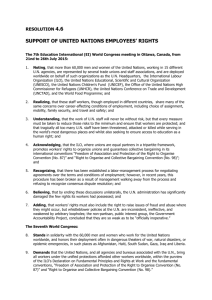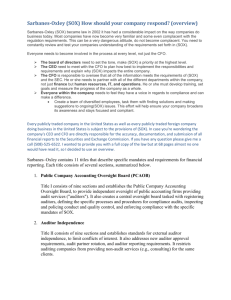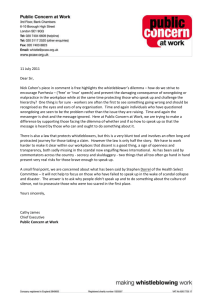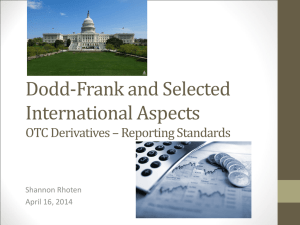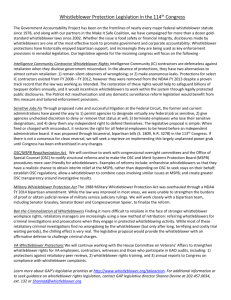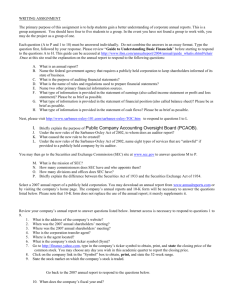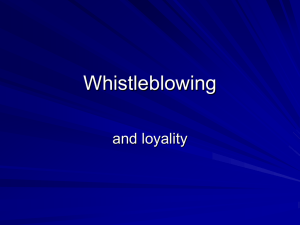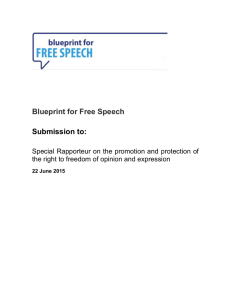recent legislation - Harvard Law Review
advertisement
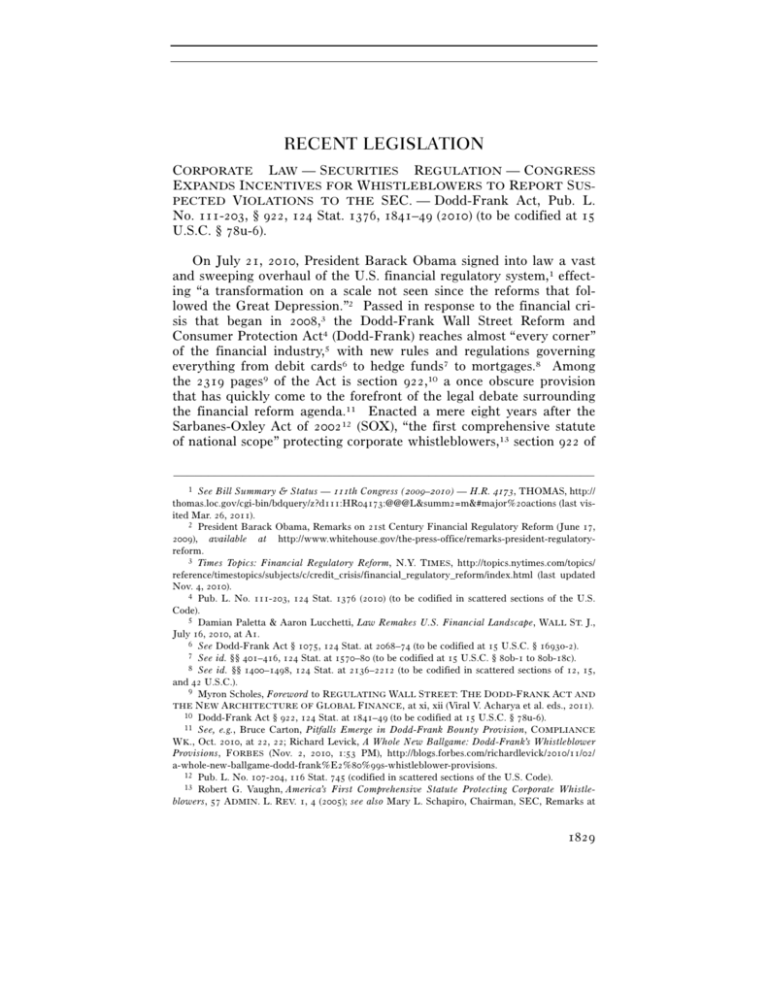
RECENT LEGISLATION CORPORATE LAW — SECURITIES REGULATION — CONGRESS EXPANDS INCENTIVES FOR WHISTLEBLOWERS TO REPORT SUSPECTED VIOLATIONS TO THE SEC. — Dodd-Frank Act, Pub. L. No. 111-203, § 922, 124 Stat. 1376, 1841–49 (2010) (to be codified at 15 U.S.C. § 78u-6). On July 21, 2010, President Barack Obama signed into law a vast and sweeping overhaul of the U.S. financial regulatory system,1 effecting “a transformation on a scale not seen since the reforms that followed the Great Depression.”2 Passed in response to the financial crisis that began in 2008,3 the Dodd-Frank Wall Street Reform and Consumer Protection Act4 (Dodd-Frank) reaches almost “every corner” of the financial industry,5 with new rules and regulations governing everything from debit cards6 to hedge funds7 to mortgages.8 Among the 2319 pages9 of the Act is section 922,10 a once obscure provision that has quickly come to the forefront of the legal debate surrounding the financial reform agenda.11 Enacted a mere eight years after the Sarbanes-Oxley Act of 200212 (SOX), “the first comprehensive statute of national scope” protecting corporate whistleblowers,13 section 922 of ––––––––––––––––––––––––––––––––––––––––––––––––––––––––––––– 1 See Bill Summary & Status — 111th Congress (2009–2010) — H.R. 4173, THOMAS, http:// thomas.loc.gov/cgi-bin/bdquery/z?d111:HR04173:@@@L&summ2=m&#major%20actions (last visited Mar. 26, 2011). 2 President Barack Obama, Remarks on 21st Century Financial Regulatory Reform (June 17, 2009), available at http://www.whitehouse.gov/the-press-office/remarks-president-regulatoryreform. 3 Times Topics: Financial Regulatory Reform, N.Y. TIMES, http://topics.nytimes.com/topics/ reference/timestopics/subjects/c/credit_crisis/financial_regulatory_reform/index.html (last updated Nov. 4, 2010). 4 Pub. L. No. 111-203, 124 Stat. 1376 (2010) (to be codified in scattered sections of the U.S. Code). 5 Damian Paletta & Aaron Lucchetti, Law Remakes U.S. Financial Landscape, WALL ST. J., July 16, 2010, at A1. 6 See Dodd-Frank Act § 1075, 124 Stat. at 2068–74 (to be codified at 15 U.S.C. § 1693o-2). 7 See id. §§ 401–416, 124 Stat. at 1570–80 (to be codified at 15 U.S.C. § 80b-1 to 80b-18c). 8 See id. §§ 1400–1498, 124 Stat. at 2136–2212 (to be codified in scattered sections of 12, 15, and 42 U.S.C.). 9 Myron Scholes, Foreword to REGULATING WALL STREET: THE DODD-FRANK ACT AND THE NEW ARCHITECTURE OF GLOBAL FINANCE, at xi, xii (Viral V. Acharya et al. eds., 2011). 10 Dodd-Frank Act § 922, 124 Stat. at 1841–49 (to be codified at 15 U.S.C. § 78u-6). 11 See, e.g., Bruce Carton, Pitfalls Emerge in Dodd-Frank Bounty Provision, COMPLIANCE WK., Oct. 2010, at 22, 22; Richard Levick, A Whole New Ballgame: Dodd-Frank’s Whistleblower Provisions, FORBES (Nov. 2, 2010, 1:53 PM), http://blogs.forbes.com/richardlevick/2010/11/02/ a-whole-new-ballgame-dodd-frank%E2%80%99s-whistleblower-provisions. 12 Pub. L. No. 107-204, 116 Stat. 745 (codified in scattered sections of the U.S. Code). 13 Robert G. Vaughn, America’s First Comprehensive Statute Protecting Corporate Whistleblowers, 57 ADMIN. L. REV. 1, 4 (2005); see also Mary L. Schapiro, Chairman, SEC, Remarks at 1829 1830 HARVARD LAW REVIEW [Vol. 124:1829 Dodd-Frank dramatically expands the incentives for whistleblowers to come forward by (1) requiring the Securities and Exchange Commission (SEC) to award hefty bounties to persons who provide useful information to the SEC regarding securities law violations14 and (2) enhancing retaliation protections for those who provide such information.15 But rather than strengthening protections across the board, section 922 actually creates a two-tiered system of retaliation protection in which whistleblowers may receive stronger, more robust protection if they report directly to the SEC, but weaker, less reliable protection if they report to the company. This two-tiered structure discourages internal reporting and thus will likely undermine internal compliance and reporting systems and impede the effective functioning of the securities regulation system.16 Although the progress of the Dodd-Frank bill through the House and Senate was marked by intense industry lobbying and divisive partisan struggles,17 the whistleblower provisions received little attention on the road to passage.18 The bill that would later become the DoddFrank Act was introduced in the House of Representatives by Representative Barney Frank on December 2, 2009, and passed the House just nine days later.19 Though the Senate later substituted its own version of the whistleblower provisions, substantially modifying the language and inserting a minimum bounty, it left the core provisions of the House version, including the basic design of the retaliation protec––––––––––––––––––––––––––––––––––––––––––––––––––––––––––––– the Open Meeting of the SEC (Nov. 3, 2010), available at http://www.sec.gov/news/openmeetings/ 2010/110310openmeeting.shtml. 14 See Dodd-Frank Act § 922(a), 124 Stat. at 1841–42. 15 See id. at 1845–46. 16 The business and legal communities, as well as the SEC, have recognized the potential for the large bounties required by the Act to similarly undermine internal compliance procedures by causing a race to the SEC. See, e.g., Proposed Rules for Implementing the Whistleblower Provisions of Section 21F of the Securities Exchange Act of 1934, 75 Fed. Reg. 70,488, 70,488 (proposed Nov. 17, 2010) (to be codified at 17 C.F.R. pts. 240, 249) [hereinafter Proposed Rules]; Letter from the Ass’n of Corporate Counsel to Elizabeth M. Murphy, Sec’y, SEC 1–2 (Dec. 15, 2010), available at http://www.sec.gov/comments/s7-33-10/s73310-126.pdf; Letter from Bus. Roundtable to Elizabeth M. Murphy, Sec’y, SEC 2 (Dec. 17, 2010), available at http://www.sec.gov/comments/s7-3310/s73310-142.pdf. Because the bounties and the two-tiered nature of the retaliation protections both independently incentivize external reporting, any effort to correct this incentive flaw in the design of Dodd-Frank must address both provisions. 17 See Times Topics: Financial Regulatory Reform, supra note 3. In the end, the Act passed in the House with the support of only three Republicans. In the Senate, the Act passed with the support of only three Republicans and all but one Democrat. Id. The only Democratic opposition came from Wisconsin Senator Russ Feingold, who voted against the measure because he felt that it did not contain enough regulation of Wall Street. Id. 18 See Carton, supra note 11, at 22 (describing section 922 as a “little-known sleeper section of the law”); Levick, supra note 11 (describing section 922 as a “relatively obscure provision of hotly debated legislation”). 19 See Bill Summary & Status — 111th Congress (2009–2010) — H.R. 4173, supra note 1. 2011] RECENT LEGISLATION 1831 tions, largely intact.20 When the Senate passed the bill with amendments on May 20, 2010,21 section 922 was essentially in its final form; with the exception of a few minor changes in wording, the conference committee did not change it.22 As enacted, section 922 amends the Securities Exchange Act of 193423 (Exchange Act) by adding a new provision: section 21F, “Securities Whistleblower Incentives and Protection.”24 It defines a whistleblower as any individual or group of individuals “who provide[] information relating to a violation of the securities laws to the Commission, in a manner established, by rule or regulation, by the Commission.”25 It goes on to provide that in any judicial or administrative action brought by the SEC that results in sanctions exceeding $1 million, or in any related action, the SEC “shall pay an award” to any whistleblowers “who voluntarily provided original information to the Commission that led to the successful enforcement of the . . . action, in an aggregate amount” of between ten and thirty percent of the monetary sanctions imposed.26 To protect whistleblowers, new section 21F(h)(1)(A) prohibits employers from discharging, demoting, suspending, threatening, harassing, or in any other manner discriminating against a whistleblower “because of any lawful act done by the whistleblower” in (1) providing information to the SEC, (2) assisting in any SEC investigation or action related to such information, or (3) “in making disclosures that are required or protected under” any securities law, rule, or regulation.27 To enforce this prohibition, new section 21F(h)(1)(B) creates a private right of action for individuals alleging a violation of the antiretaliation provisions.28 This once obscure section of Dodd-Frank may in fact turn out to be one of the most influential. Perhaps due to a drafting error or per––––––––––––––––––––––––––––––––––––––––––––––––––––––––––––– 20 Compare H.R. 4173, 111th Cong. § 922 (as passed by Senate, May 20, 2010), with H.R. 4173, 111th Cong. § 7203 (as passed by House, Dec. 11, 2009). The Senate maintained the retaliation protections for those who provide information to the SEC or assist in investigations, and added protection for whistleblowers who make certain other disclosures. See H.R. 4173, 111th Cong. § 922 (as passed by Senate, May 20, 2010). In its report on the bill, the Senate Committee on Banking, Housing, and Urban Affairs explained the addition of the minimum bounty by noting that “[t]he program is modeled after a successful IRS Whistleblower Program . . . which, too, has . . . similar minimum-maximum award levels . . . . The Committee feels the critical component of the Whistleblower Program is the minimum payout . . . .” S. REP. NO. 111-176, at 111 (2010). 21 See Bill Summary & Status — 111th Congress (2009–2010) — H.R. 4173, supra note 1. 22 Compare H.R. 4173, 111th Cong. § 922 (as passed by Senate, May 20, 2010), with DoddFrank Act § 922, 124 Stat. at 1841–49. 23 15 U.S.C. §§ 78a–78pp (2006 & Supp. I 2009). 24 Dodd-Frank Act § 922(a), 124 Stat. at 1841. 25 Id. at 1842. 26 Id. at 1841–42. 27 Id. at 1845–46. 28 Id. at 1846. 1832 HARVARD LAW REVIEW [Vol. 124:1829 haps by intentional design, Congress has written section 922 so that its retaliation protections apply only to those who report information externally, leaving those who report internally either unprotected or protected only by the weaker protections of SOX. And by providing a potential whistleblower with stronger, more robust protection against retaliation if he or she reports suspected securities violations directly to the SEC rather than to the company, these new antiretaliation provisions discourage internal reporting, thereby undermining the internal compliance and reporting programs that were so central to the SOX reform efforts and that continue to play an important role in the early detection and prevention of fraud and other securities violations today. First, and importantly, the text of section 922 reveals that Congress has limited its protections to those who report externally. The prohibition on retaliation contained in new section 21F(h)(1) of the Exchange Act applies only to “whistleblowers.”29 As previously mentioned, however, the term “whistleblower” is defined narrowly in new section 21F(a)(6) to include only those who provide “information relating to a violation of the securities laws to the Commission, in a manner established, by rule or regulation, by the Commission.”30 This definition unambiguously indicates that a person who reports only internally cannot qualify as a “whistleblower” under section 21F and is therefore not protected by its antiretaliation provisions.31 To understand the ways in which the narrow scope of the DoddFrank retaliation protections undermines the internal compliance goals of Congress and the SEC, a brief discussion of the comparable provisions in SOX is necessary. SOX, like Dodd-Frank, was passed in response to a financial crisis, precipitated by a series of corporate scandals including those of Enron, WorldCom, Global Crossing, and Tyco.32 Through SOX, Congress took a “new approach to regulation ––––––––––––––––––––––––––––––––––––––––––––––––––––––––––––– 29 See id. at 1845. The new section 21F(h)(1)(A) — “Prohibition Against Retaliation” — states that “[n]o employer may [retaliate against] a whistleblower . . . because of any lawful act done by the whistleblower” in providing information, assisting in investigations, or making certain disclosures. Id. at 1845–46 (emphasis added). 30 Id. at 1842 (emphasis added). 31 One could argue that new section 21F(h)(1)(A)(iii)’s prohibition on retaliation for “disclosures that are required or protected under the Sarbanes-Oxley Act,” id. at 1846, evinces an intent to cover internal whistleblower reports. But given the precise definition of “whistleblower” that the statute provides to govern section 21F, see id. at 1841 (“In this section the following definitions shall apply . . . .”), and the fact that the subject of the protections is “whistleblowers,” interpreting the antiretaliation provisions to apply to those who report internally would be an inappropriate interpretation of the statute’s unambiguous words. See Conn. Nat’l Bank v. Germain, 503 U.S. 249, 253–54 (1992) (“[C]ourts must presume that a legislature says in a statute what it means and means in a statute what it says there.” (citations omitted)); Chevron U.S.A. Inc. v. Natural Res. Def. Council, Inc., 467 U.S. 837, 843–44 (1984). 32 See JAMES D. COX ET AL., SECURITIES REGULATION 10 (6th ed. 2009); Vaughn, supra note 13, at 2. 2011] RECENT LEGISLATION 1833 that relies on internal monitoring, reporting, and problem solving”33 and enacted a number of accounting and corporate governance reforms.34 In order to encourage employees to provide information about corporate wrongdoing, SOX requires that reporting companies35 form internal disclosure systems through which employees can report misconduct anonymously36 and creates antiretaliation provisions to protect employees from the potential adverse employment consequences of blowing the whistle.37 Section 806 of SOX protects employees who provide information to a federal regulatory or law enforcement agency, a member or committee of Congress, or a person with supervisory authority over the whistleblower regarding conduct that they “reasonably believe” constitutes a violation of one of the enumerated criminal statutes,38 any SEC rule or regulation, or any federal law relating to shareholder fraud.39 Perhaps in response to the many criticisms of the weak nature of the protections under SOX,40 Congress strongly increased the protection of whistleblowers under Dodd-Frank, though only for those who can qualify for its protection by reporting externally. Unlike SOX, Dodd-Frank protects whistleblowers who provide information about a possible breach of any securities law (including all of those listed in SOX) and does not limit the protection to those who provide the information with a “reasonable belief” that a breach actually occurred.41 ––––––––––––––––––––––––––––––––––––––––––––––––––––––––––––– 33 Orly Lobel, Lawyering Loyalties: Speech Rights and Duties within Twenty-First-Century New Governance, 77 FORDHAM L. REV. 1245, 1251 (2009). 34 See ANDREW L. SANDLER ET AL., CONSUMER FINANCIAL SERVICES § 7.02[1] (2010). 35 A reporting company, at least for purposes of the whistleblower provisions, is one “with a class of securities registered under section 12” of the Exchange Act, “or that is required to file reports under section 15(d)” of the Exchange Act, or a “nationally recognized statistical rating organization (as defined in section 3(a) of [the Exchange Act]).” 18 U.S.C. § 1514A(a) (2006), amended by Dodd-Frank Act, §§ 922(b)–(c), 929A, 124 Stat. at 1848, 1852. Nonreporting companies are not subject to SOX. 36 See 15 U.S.C. § 78j-1(m)(4)(B) (2006). 37 Richard E. Moberly, Unfulfilled Expectations: An Empirical Analysis of Why SarbanesOxley Whistleblowers Rarely Win, 49 WM. & MARY L. REV. 65, 75 (2007); see also 15 U.S.C. § 78j-1(m)(4)(B); 18 U.S.C. § 1514A (2006). 38 The enumerated criminal statutes include mail fraud, 18 U.S.C. § 1341, wire fraud, id. § 1343, bank fraud, id. § 1344, and securities fraud, id. § 1348. See id. § 1514A(a)(1). 39 Id. § 1514A(a)(1). 40 See, e.g., Terry Morehead Dworkin, SOX and Whistleblowing, 105 MICH. L. REV. 1757, 1764 (2007) (“Sarbanes-Oxley . . . gives the illusion of protection without truly meaningful opportunities or remedies for achieving it.”); Moberly, supra note 37, at 74 (“Sarbanes-Oxley failed to fulfill the great expectations generated by the Act’s purportedly strong anti-retaliation protections.”); Valerie Watnick, Whistleblower Protections Under the Sarbanes-Oxley Act, 12 FORDHAM J. CORP. & FIN. L. 831, 834 (2007) (“[A]s the Act is being implemented, the SarbanesOxley whistleblower provisions will not protect and encourage corporate whistleblowers.”). One study of all complaints filed under SOX in the first three years after its enactment showed that on initial consideration, employees won only 3.6% of the time. Moberly, supra note 37, at 67. 41 Dodd-Frank Act § 922(a), 124 Stat. at 1841–42, 1845. 1834 HARVARD LAW REVIEW [Vol. 124:1829 Furthermore, Dodd-Frank creates a new direct private right of action whereby a whistleblower can file a complaint directly in district court without first having to exhaust administrative remedies with the Department of Labor.42 Dodd-Frank also gives an aggrieved employee more time to file his or her complaint, allowing a whistleblower to bring a claim up to six years after the violation occurs, or up to three years after becoming aware of the claim provided that the claim is brought within ten years of the violation,43 whereas SOX requires an employee to file a complaint within 180 days of the violation or of becoming aware of the violation.44 And when it comes to direct remedies, although the retaliation protections of both SOX and DoddFrank allow a whistleblower to receive reasonable attorneys’ fees and related costs as well as reinstatement with equivalent seniority, a whistleblower who prevails under a section 922 claim may recover double back pay with interest, while a whistleblower who prevails under SOX may recover only compensatory back pay with interest.45 As a result of these new provisions, then, Dodd-Frank has created a two-tiered structure of protections where potential whistleblowers receive different sets of protections depending on whether they choose to report internally or externally. More specifically, for types of information and employers not covered by SOX, employees can receive Dodd-Frank protections by reporting externally, but they receive no protection if they report internally; and for information and employers that are covered by SOX (which are now also covered by section 922), employees can receive Dodd-Frank protections by reporting externally, but they receive only the weaker SOX protections by reporting internally. A whistleblower who is primarily worried about retaliation thus has every incentive to report directly to the SEC, or at the very least report to the SEC and the company at the same time, to avoid being without sufficient retaliation protection for any period of time. Because a “culture of compliance and integrity” is vital to the maintenance of effective internal compliance programs,46 and the “sine qua non requirement for these programs to work . . . is the expectation that employees will report misconduct internally,”47 this incentive to report ––––––––––––––––––––––––––––––––––––––––––––––––––––––––––––– 42 See id. at 1846. A whistleblower who alleges retaliation pursuant to SOX must first file a complaint with the Secretary of Labor and may bring an action in district court only if the Secretary has not issued a final decision within 180 days. 18 U.S.C. § 1514A(b)(1). 43 See Dodd-Frank Act § 922(a), 124 Stat. at 1846. 44 18 U.S.C. § 1514A(b)(2)(D), amended by Dodd-Frank Act § 922(c)(1)(A)(i), 124 Stat. at 1848. 45 See id. § 1514A(c); Dodd-Frank Act § 922(a), 124 Stat. at 1846. 46 Letter from Bus. Roundtable to Elizabeth M. Murphy, supra note 16, at 2. 47 Letter from the Ass’n of Corporate Counsel to Elizabeth M. Murphy, supra note 16, at 3. 2011] RECENT LEGISLATION 1835 externally could unravel the years of effort that have been put into maintaining healthy internal compliance systems.48 Unfortunately, this potential circumvention of internal reporting could have vast costs and indeed could undermine the very goal that section 922 was enacted to promote — the effective and efficient detection of securities law violations. As Professors Terry Dworkin and Elletta Callahan have argued, “[i]f . . . the primary goal of whistleblowing is reduction of wrongdoing rather than prosecution of wrongdoers, and the speed with which problems are addressed is significant, then internal whistleblowing should be preferred” to external whistleblowing.49 After all, the SEC has limited resources, and external reporting has the potential to result in “an overflow of noisy signals — that is, a large number of tips of varying quality — causing the Commission to incur costs to process and validate the information.”50 In contrast, internal reporting allows a company to detect and investigate wrongdoing early on;51 to quickly evaluate the merits of reported violations;52 to correct potential wrongdoing in a timely and efficient manner or “at least mitigate the damages”;53 to revise internal controls and procedures to address possible systemic problems;54 to avoid the negative publicity and socially costly investigations that ensue after an external report, especially one that is erroneous or exaggerated;55 to “prevent the negative consequences to the work environment and the ––––––––––––––––––––––––––––––––––––––––––––––––––––––––––––– 48 See Proposed Rules, supra note 16, at 70,516 (“[C]reat[ing] incentives for employees of companies to submit information regarding potential violations to the Commission rather than to compliance personnel or through compliance procedures . . . could undermine the effectiveness of internal company compliance processes.”). 49 Terry Morehead Dworkin & Elletta Sangrey Callahan, Internal Whistleblowing: Protecting the Interests of the Employee, the Organization, and Society, 29 AM. BUS. L.J. 267, 306 (1991); see also id. at 299 n.167 (“[T]he overwhelming majority of researchers endorse internal whistleblowing as the most effective response to organizational wrongdoing.”). Dworkin and Callahan also argue that “when the internal/external question is posed in the context of social-psychological research generally, and especially when approached from the perspective of organizational needs and behavior, there is little doubt that internal whistleblowing is preferable to external reporting.” Id. at 299. 50 Proposed Rules, supra note 16, at 70,516. 51 Letter from the Ass’n of Corporate Counsel to Elizabeth M. Murphy, supra note 16, at 2; Letter from Bus. Roundtable to Elizabeth M. Murphy, supra note 16, at 6. 52 See Proposed Rules, supra note 16, at 70,516 (“[T]he [whistleblower] could be mistaken about securities laws, and the compliance personnel would likely be better informed about whether certain conduct constitutes a violation of securities laws. . . . Allowing [employees to report internally first], we believe, provides a mechanism by which some of those erroneous cases may be eliminated before reaching the Commission . . . .”). 53 See Kevin Rubinstein, Internal Whistleblowing and Sarbanes-Oxley Section 806: Balancing the Interests of Employee and Employer, 52 N.Y.L. SCH. L. REV. 637, 650 (2007–2008). 54 Letter from Bus. Roundtable to Elizabeth M. Murphy, supra note 16, at 6. 55 See Terry Morehead Dworkin & Janet P. Near, Whistleblowing Statutes: Are They Working?, 25 AM. BUS. L.J. 241, 242–43 (1987). 1836 HARVARD LAW REVIEW [Vol. 124:1829 whistleblower that almost inevitably follow external whistleblowing”;56 and to self-report to the SEC in situations where it is necessary or appropriate to do so.57 Indeed, research shows that the single most effective means of combating occupational fraud is a company’s internal use of an anonymous reporting system.58 And even the SEC itself consistently admits that “internal compliance and reporting systems are essential sources of information for companies about misconduct”59 and that “[i]f these programs are not utilized or working, our system of securities regulation will be less effective.”60 Thus, “in order to assure that the robust and effective corporate internal compliance and reporting systems we value, and that regulators have mandated, may continue to cultivate healthy and responsible corporate cultures,”61 Congress should amend Dodd-Frank or SOX — or both — such that the two provide equivalent protections for potential whistleblowers regardless of whether they choose to report internally or externally.62 Although such an amendment would not be the first to Dodd-Frank,63 it could certainly be one of the most important to fulfilling the “investor protection mission”64 of Dodd-Frank and of the SEC in general. ––––––––––––––––––––––––––––––––––––––––––––––––––––––––––––– 56 Id. at 242; see also Lobel, supra note 33, at 1250 (“[T]he negative individual and organizational consequences of [internal reporting] are often less harsh than choosing external reporting.”). 57 See Letter from the Ass’n of Corporate Counsel to Elizabeth M. Murphy, supra note 16, at 4. 58 See ASS’N OF CERTIFIED FRAUD EXAM’RS, 2008 REPORT TO THE NATION ON OCCUPATION FRAUD & ABUSE 18 (2008); see also Lobel, supra note 33, at 1250 (“[I]nternal protections are particularly crucial in view of research findings that . . . employees are more likely to choose internal reporting systems.”). 59 Proposed Rules, supra note 16, at 70,496. 60 Id. at 70,500; see also id. at 70,496 (“Compliance with the Federal securities laws is promoted when companies have effective programs for identifying, correcting, and self-reporting unlawful conduct by company officers or employees.”). Of course, internal reporting alone would be insufficient; there are certainly situations in which internal reporting may be blocked or prove futile. But it is contrary to the policy goals of minimizing fraud and other securities laws violations to discourage internal reporting even where it is working well. 61 Letter from the Ass’n of Corporate Counsel to Elizabeth M. Murphy, supra note 16, at 1. 62 To remedy the external reporting incentive that stems from the antiretaliation provisions, it does not matter if the equivalent protections are like those in SOX, in Dodd-Frank, or anywhere in between; so long as the protections for reporting internally and externally are the same, there is no antiretaliation incentive to report externally. 63 See, e.g., Act of Oct. 5, 2010, Pub. L. No. 111-257, 124 Stat. 2646 (repealing the Dodd-Frank provisions that exempted certain records from the Freedom of Information Act’s public disclosure requirements); Act of Dec. 29, 2010, Pub. L. No. 111-343, 124 Stat. 3609 (correcting a drafting error in Dodd-Frank and assuring continued full Federal Deposit Insurance Corporation protection for lawyer trust accounts). 64 Proposed Rules, supra note 16, at 70,500.
